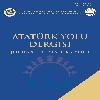1950-1960 YILLARI ARASINDA TÜRKİYE’DE SOL İDEOLOJİNİN GÜVENLİKLEŞTİRİLMESİ
SECURITIZATION OF THE LEFT IDEOLOGY AND MOVEMENTS IN TURKEY BETWEEN 1950 AND 1960
___
- Türkiye Büyük Millet Meclisi Zabıt Ceridesi
- Akgül-Açıkmeşe, Sinem. “Algı mı, Söylem mi? Kopenhag Okulu ve Yeni Klasik Gerçekçilikte Güvenlik Tehditleri”, Uluslararası İlişkiler. 8/30 (2011): 43-73.
- Akkaya, Bülent. “Türkiye’nin NATO Üyeliği ve Kore Savaşı”, Akademik Bakış Dergisi. 28 (2012): 1-20.
- Arıkan, Zeki. “Halkevlerinin Kurulusu ve Tarihsel İşlevi”, Ankara Üniversitesi Türk İnkılâp Tarihi Enstitüsü Atatürk Yolu Dergisi. 6/23 (1999): 261-280.
- Arslan, Zehra. “Türk-Rus İlişkileri Ekseninde Türkiye’de İktidarların ‘Sol’ Algısı (1923-1960)”, Karadeniz Araştırmaları. 51 (2016): 171-190.
- Atland, Kristian ve Bruusgaard, Kristin Ven. “When Security Speech Acts Misfire: Russia and the ‘Elektron’ Incident”, Security Dialogue. 40/3 (2009): 333-353.
- Aysal, Necdet. “Anadolu'da Aydınlanma Hareketinin Doğuşu: Köy Enstitüleri”, Ankara Üniversitesi Türk İnkılâp Tarihi Enstitüsü Atatürk Yolu Dergisi. (2005): 267-282.
- Baylis, John. “Uluslararası İlişkilerde Güvenlik Kavramı”, Uluslararası İlişkiler. 5/18 (2008): 69-85.
- Baysal, Başar ve Lüleci, Çağla. “Kopenhag Okulu ve Güvenlikleştirme Teorisi”, Güvenlik Stratejileri. 11/22 (2015): 61-96.
- Berinsky, Adam J. ve Lenz, Gabriel S. “Red Scare? Revisiting Joe McCarthy’s Influence on 1950’s Elections”, Public Opinion Quarterly. 78/2 (2014): 369–391.
- Bostdorff, Denise M. “Harry S. Truman, ‘Special Message to the Congress on Greece and Turkey: The Truman Doctrine’ (12 MARCH 1947)”, Voices of Democracy. 4 (2009): 1-22.
- Demir, Şerif. “Adnan Menderes ve 6/7 Eylül Olayları”, Yakın Dönem Türkiye Araştırmaları. 12 (2012): 37-63.
- Durak, Gökhan. “Türk ve Dünya Basınında Kore Savaşı ve Türkiye”, Uluslararası Sosyal Araştırmalar Dergisi. 8/36 (2015): 323-339.
- Ekmen, Bahadır. “Zorlayıcı Diplomasi Bağlamında Küba Füze Krizi’nin Analizi”, Journal of Diplomatic Research. 3/1 (2021): 91-108.
- Emmers, Ralf. “Güvenlikleştirme”, Çağdaş Güvenlik Çalışmaları. Der. Alan Colins. Çev. Nasuh Uslu. İstanbul: Uluslararası İlişkiler Kütüphanesi, 2017: 131-144.
- Günar, Altuğ. “Amerika Birleşik Devletleri’nde McCharty Dönemi ve Dış Politika Üzerinde Etkileri”, Nevşehir Hacı Bektaş Veli Üniversitesi Sosyal Bilimler Enstitüsü Dergisi. 4 (2014): 62-78.
- Gürel, Şükrü S. “Berlin Sorunu (1944-1972)”, Ankara Üniversitesi SBF Dergisi. 32/1 (1977): 207-229.
- Kahya, Pınar. “Soğuk Savaş Dönemi Türkiye Düşünce Hayatında Türk Barışseverler Cemiyeti: “Niçin Sovyetler Birliği’nin Dostu?”, Mülkiye Uluslararası İlişkiler Kongresi. Ankara, (2017): 247-252.
- Kalyon, Levent. “Truman Doktrini Üzerine Bir Analiz”, Güvenlik Stratejileri Dergisi, 11 (2010): 7-26.
- Köse, İsmail. “Boraltan Faciası: Türk Kökenli Sovyet Vatandaşı Mültecilerin Sovyetler Birliği’ne İadesi”, Atatürk Araştırma Merkezi Dergisi, 32/93 (2016): 149-186.
- Meşe, Ertuğrul. Türk Siyasal Yaşamında Komünizmle Mücadele Dernekleri. Yüksek Lisans Tezi, Selçuk Üniversitesi Sosyal Bilimler Enstitüsü, 2013
- Miş, Nebi. "Güvenlikleştirme Teorisi ve Siyasal Olanın Güvenlikleştirilmesi", Akademik İncelemeler Dergisi, 6 (2014): 345- 381.
- Neziroğlu, İrfan ve Yılmaz, Tuncer. Başbakanlarımız ve Genel Kurul Konuşmaları (Cumhuriyet Hükümetleri Dönemi) Adnan Menderes. 4, Ankara: TBMM Basımevi, 2014.
- Örnek, Cangül. 1950’li Yıllarda ABD ile Buluşma: Anti-komünizm, Modernleşmecilik ve Maneviyatçılık. Doktora Tezi, Marmara Üniversitesi Sosyal Bilimler Enstitüsü, 2010.
- Özdemir, Emin ve Şendil, A. Fatih. “Soğuk Savaş Dönemi Algı ile Gerçek Arasında Bir İmge Olarak Türk Solu; Demokrat Parti’nin Sol Hareketlere Yaklaşımı”, Cumhuriyet Tarihi Araştırmaları Dergisi, C. 12, Sayı: 23 (2016), s. 337-368.
- Özdemir, Yavuz ve Aktaş, Elif. “Halkevleri (1932’den 1951’e)”, A.Ü. Türkiyat Araştırmaları Enstitüsü Dergisi (TAED). 45 (2011): 242-258.
- Sancaktar, Caner. “Demokrat Parti Dönemi Türk Dış Politikası’na Marksist Yaklaşım”, Bilge Strateji. 2/5 (2011): 23-91.
- Sayılgan, Aclan. Türkiye’de Sol Hareketler. İstanbul: Doğu Kütüphanesi, 5. Baskı, 2009.
- Yıldız, Nihal ve Akandere, Osman. “Köy Enstitülerinin İdeolojik Yapısı”, Çağdaş Türkiye Tarihi Araştırmaları Dergisi. 17/35 (2017): 275-316.
- Zora, Kadir. “Güvenlikleştirme: Hukuksal Meşruiyetten Sosyal Meşruiyete Evrilme ve Kopenhag Okulu”, Selçuk Üniversitesi Hukuk Fakültesi Dergisi. 23/2 (2015): 111-126.
- Yayın Aralığı: Yılda 2 Sayı
- Başlangıç: 1988
- Yayıncı: Ankara Üniversitesi Türk İnkılap Tarihi Enstitüsü
SÖMÜRGECİLİĞİN TARİHSEL SEYRİ VE XIX. YÜZYILDA İNGİLİZ SÖMÜRGECİLİĞİNİN KODLARI
ATATÜRK VE SİNEMA: TÜRK SİNEMASINDA ATATÜRK FİLMLERİ
ADANA HALKEVİ KÖYCÜLÜK ŞUBESİ VE FAALİYETLERİ
TEK PARTİLİ DÖNEMİN ÖRGÜN EĞİTİM KURUMLARI: KENT VE KÖY UYGULAMALARIYLA KOCAELİ ÖRNEĞİ
OSMANLI DEVLETİ’NDE ORMANCILIK EĞİTİMİNİN DEĞİŞEN BOYUTLARI VE ORMAN AMELİYAT MEKTEPLERİ
Ümit AKAGÜNDÜZ, Ahmet NİZAMOĞLU
1950-1960 YILLARI ARASINDA TÜRKİYE’DE SOL İDEOLOJİNİN GÜVENLİKLEŞTİRİLMESİ
LOZAN KONFERANSI ÖNCESİNDE TBMM’NİN ANKARA DIŞINA TAŞINMASINA İLİŞKİN MECLİS’TE YAPILAN TARTIŞMALAR
KÖY ENSTİTÜLERİNDE İŞ VE ÜRETİM ODAKLI EĞİTİM, KÜME ÇALIŞMALARI VE İMECE
GELENEĞİN YENİDEN HATIRLANMASI: TÜRKİYE’DE KETENİN TOPLUMSAL TARİHİ
EISENHOWER DOKTRİNİNİN DEMOKRAT PARTİ DÖNEMİ TÜRK DIŞ POLİTİKASINA ETKİLERİ
